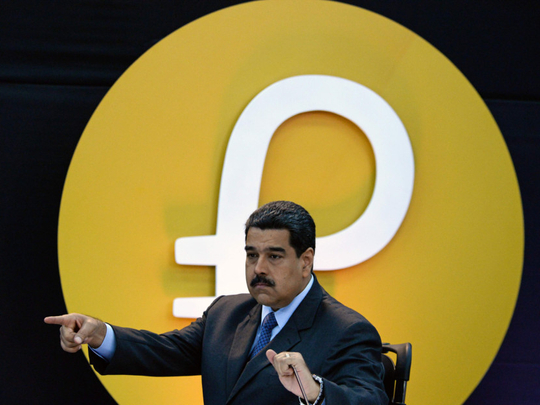
Come election time in Britain, many of Jeremy Corbyn’s words will be read back to him, but none so poignant as these, delivered a year ago as Venezuelan President Maduro was sending in riot squads to squash anti-government protests: “The issues in Venezuela are partly structural because not enough has been done to diversify the economy away from oil — that has to be a priority for the future. But we also have to recognise that there have been effective and serious attempts at reducing poverty, improving literacy and improving the lives of the poorest people”.
That was a country which at the time was suffering annual GDP growth of minus 8 per cent, inflation of 481 per cent and unemployment of 17 per cent. But none of this bad news had anything to do with what, according to the British Labour leader, was a successful socialist experiment — it was just thanks to over-dependence on oil. A little divestment from fossil fuels and all, presumably, would be well.
Over the past 12 months Venezuela has divested from fossil fuels all right. Oil production has fallen by a further quarter, taking production back to levels last seen in 1947. Yet there is still scant sign of the socialist paradise which Corbyn appears to imagine. On the contrary, inflation has since swelled to 83,000 per cent, with GDP now at half the level it was in 2013. Some 2.3 million of the country’s 32 million people have fled, 600,000 of whom have sought asylum in Colombia and 290,000 in the US. If the exodus carries on much longer it could challenge the 4.9 million refugees who have fled Syria since the civil war began in 2011. For those who remain in Venezuela, malnutrition is rife, with nine in 10 people saying they cannot get enough food.
This, to Corbyn, who never loses a chance to damn the evils of “Tory austerity” in Britain, amounts to “effective and serious efforts at reducing poverty”.
Venezuela’s precipitous economic decline is as dramatic as any witnessed in any country in modern times. In 2014, before the Venezuelan crisis had really begun to bite, US economists Carmen Reinhart and Kenneth Rogoff ranked 100 economic crises of the past 150 years. The Great Depression of 1929, when the US economy shrunk by 28.6 per cent between 1929 and 1933, came 13th. Greece’s sovereign debt crisis, with a shrinkage of 24 per cent, came 15th, and Ireland’s euro-induced crash of 2008/09, when the economy shrunk by 12.9 per cent, came 26th.
Top of the Reinhart and Rogoff table was Chile’s experience of the Great Depression — when the economy shrunk by 46.6 per cent over three years. Venezuela, once South America’s richest country and which in 1970 had a GDP per head higher than Spain, already challenges that. And the crisis is not over yet. Maduro’s “economic prosperity and recovery plan”, unveiled recently, does not inspire confidence. The plan involves lopping five zeroes off the currency, the bolivar, and tying it to a crypto currency which in turn is supposedly tied to Venezuela’s oil wealth. The minimum wage will be jacked up by 3,000 per cent and the wage bills of small businesses subsidised by the government for the next three months.
In other words, Maduro is promising more of the same fiddling and fixing which brought the economy to its knees in the first place.
It is impossible to dissociate the Venezuelan crisis from the very economic measures Corbyn praises. Maduro’s predecessor Hugo Chavez, whom Corbyn described as an “inspiration to all of us fighting back against neoliberalism and austerity in Europe”, fixed prices for food, toiletries and other essentials, and subsidised oil sales to the extent that a gallon of petrol cost less than the equivalent of a US cent. The price caps and subsidies made life easier for a while but undermined many Venezuelan industries, which lost their incentive to produce. As shops emptied, goods could only be found at much higher prices on the black market and inflation grew rampant. The collapse in oil prices in 2014 intensified the problems, but the underlying stresses in the economy were already there.
That a potential — even likely — candidate for the job of British prime minister can praise a pair of leaders who have reduced a wealthy country to poverty faster and deeper than any economic collapse in modern history is deeply alarming.
All economic news at present tends to be viewed through the prism of Brexit. When a company invests, or decides not to invest, in Britain it is always our impending departure from the EU which gets the praise or blame. As a result, we tend to overlook how investors are reading what could be a far bigger influence on Britain’s economic prosperity: a Corbyn premiership.
— The Telegraph Group Limited, London 2018
Ross Clark is a British journalist.









